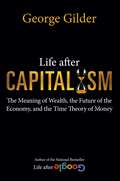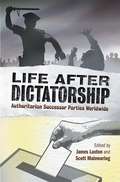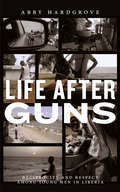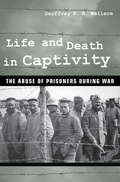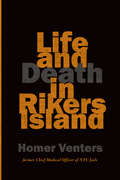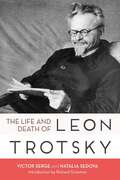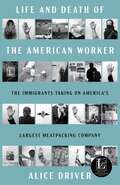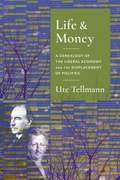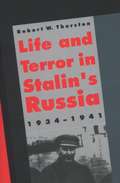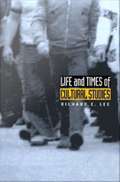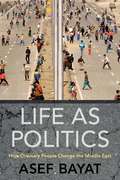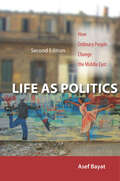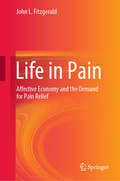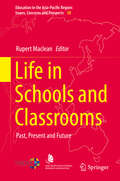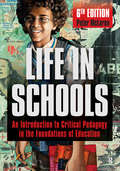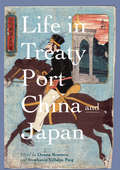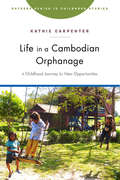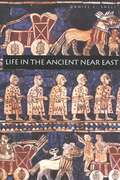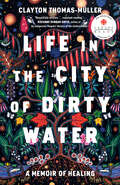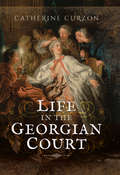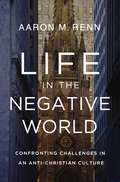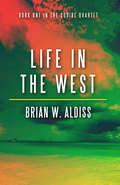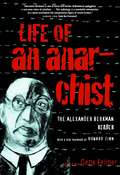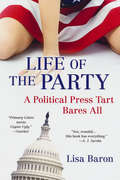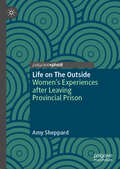- Table View
- List View
Life after Capitalism: The Meaning of Wealth, the Future of the Economy, and the Time Theory of Money
by George GilderAuthor of national bestseller Life After Google and generation-defining Wealth and Poverty, venture capitalist, futurist, and pioneering thinker extraordinaire George Gilder pinpoints how the clash of creativity with power at the heart of economic systems leads to global cognitive dissonance and argues that the creation of the novel taps capitalism's infinite promise and is humanity's only path of escape from stagnation and tyranny. Gilder once more rocks the archetypes of modern information theory and economics with a paradigm-shifting salvo of sheer brilliance.The capitalist era is over—get ready for life after capitalism.For more than two hundred years, capitalism spread wealth around the globe, bringing unprecedented prosperity and progress, liberating human potential. But something has gone terribly wrong in the world economy. Creativity and faith in the future—capitalism&’s crucial ingredients—seem to have run out. The elites think they can maintain a nation&’s wealth by printing money and investing it in favored industries. Their trust in bureaucratic experts, their cautionary paranoia, and their delusional belief that they can &“control&” everything from the spread of a virus to the weather, are sucking the life out of the economy. Ordinary people, their freedoms restricted, their prospects dim, are losing their faith in their institutions. Such misguided corporatism and pride, confusion and despair, are the result of a deep misunderstanding of capitalism itself. The bestselling futurist and venture capitalist George Gilder explains why economics is not an incentive system to be manipulated but an information system to be freed. Material resources are essentially as plentiful as the atoms of the universe. What drives economic growth in a free market is our limitless human ingenuity and creativity. Prophetic, inspiring, and paradigm-shifting, Life after Capitalism is a once-in- a-generation classic.
Life after Dictatorship: Authoritarian Successor Parties Worldwide
by Scott Mainwaring James LoxtonLife after Dictatorship launches a new research agenda on authoritarian successor parties worldwide. Authoritarian successor parties are parties that emerge from authoritarian regimes, but that operate after a transition to democracy. They are one of the most common but overlooked features of the global democratic landscape. They are major actors in Africa, Asia, Europe, and Latin America, and they have been voted back into office in over one-half of all third-wave democracies. This book presents a new set of terms, definitions, and research questions designed to travel across regions, and presents new data on these parties' prevalence and frequent return to power. With chapters from leading Africanists, Asianists, Europeanists, and Latin Americanists, it asks: why are authoritarian successor parties so common? Why are some more successful than others? And in what ways can they harm - or help - democracy?
Life after Guns: Reciprocity and Respect among Young Men in Liberia
by Abby HardgroveLife After Guns explores how ex-combatants and other post-war youth negotiated a depleted and difficult social and cultural landscape in the years following Liberia’s fourteen-year bloody civil war. Unlike others who study child soldiers, Abby Hardgrove’s ethnography looks at both former combatants and also the youth who were not recruited to fight. She focuses on the structural constraints and household and family organizations that either helped or limited opportunities as these young men grew into adulthood. Whether young men fought or not, and whether they had cultural capital before the war or not, family relations mattered a great deal in how they fared after the war.
Life and Death in Captivity: The Abuse of Prisoners during War
by Geoffrey P. WallaceWhy are prisoners horribly abused in some wars but humanely cared for in others? In Life and Death in Captivity, Geoffrey P. R. Wallace explores the profound differences in the ways captives are treated during armed conflict. Wallace focuses on the dual role played by regime type and the nature of the conflict in determining whether captor states opt for brutality or mercy. Integrating original data on prisoner treatment during the last century of interstate warfare with in-depth historical cases, Wallace demonstrates how domestic constraints and external incentives shape the fate of captured enemy combatants. Both Russia and Japan, for example, treated prisoners very differently in the Russo-Japanese War of 1904–5 and in World War II; the behavior of any given country is liable to vary from conflict to conflict and even within the same war. Democracies may be more likely to treat their captives humanely, yet this benevolence is rooted less in liberal norms of nonviolence than in concerns over public accountability. When such concerns are weak or absent, democracies are equally capable of brutal conduct toward captives. In conflicts that devolve into protracted fighting, belligerents may inflict violence against captives as part of a strategy of exploitation and to coerce the adversary into submission. When territory is at stake, prisoners are further at risk of cruel treatment as their captors seek to permanently remove the most threatening sources of opposition within newly conquered lands. By combining a rigorous strategic approach with a wide-ranging body of evidence, Wallace offers a vital contribution to the study of political violence and wartime conduct.
Life and Death in Rikers Island
by Homer VentersShining a light on the deadly health consequences of incarceration.Finalist in the PROSE Award for Best Book in Anthropology, Criminology, and Sociology by the Association of American PublishersKalief Browder was 16 when he was arrested in the Bronx for allegedly stealing a backpack. Unable to raise bail and unwilling to plead guilty to a crime he didn't commit, Browder spent three years in New York's infamous Rikers Island jail—two in solitary confinement—while awaiting trial. After his case was dismissed in 2013, Browder returned to his family, haunted by his ordeal. Suffering through the lonely hell of solitary, Browder had been violently attacked by fellow prisoners and corrections officers throughout his incarceration. Consumed with depression, Browder committed suicide in 2015. He was just 22 years old. In Life and Death in Rikers Island, Homer Venters, the former chief medical officer for New York City's jails, explains the profound health risks associated with incarceration. From neglect and sexual abuse to blocked access to care and exposure to brutality, Venters details how jails are designed and run to create new health risks for prisoners—all while forcing doctors and nurses into complicity or silence. Pairing prisoner experiences with cutting-edge research into prison risk, Venters reveals the disproportionate extent to which the health risks of jail are meted out to those with behavioral health problems and people of color. He also presents compelling data on alternative strategies that can reduce health risks. This revelatory and groundbreaking book concludes with the author's analysis of the case for closing Rikers Island jails and his advice on how to do it for the good of the incarcerated.
Life and Death of Leon Trotsky
by Victor Serge Natalia Ivanovna SedovaLeon Trotsky was one of the leaders of the Russian Revolution who was exiled and murdered following Stalin’s rise to power. Written by two of his closest collaborators, this book provides an invaluable picture of a great revolutionary and the world-historic events in which he was a leading actor.
Life and Death of the American Worker: The Immigrants Taking on America's Largest Meatpacking Company
by Alice Driver&“A startling glimpse into the meatpacking industry&’s abuse of undocumented and incarcerated workers.&” —The New York Times Book Review Winner of the J. Anthony Lukas Work-in-Progress Award, an explosive exposé of the toxic labor practices at the largest meatpacking company in America and the immigrant workers who had the courage to fight back.On June 27, 2011, a deadly chemical accident took place inside the Tyson Foods chicken processing plant in Springdale, Arkansas, where the company is headquartered. The company quickly covered it up although the spill left their employees injured, sick, and terrified. Over the years, Arkansas-based reporter Alice Driver was able to gain the trust of the immigrant workers who survived the accident. They rewarded her persistence by giving her total access to their lives. Having spent hours in their kitchens and accompanying them to doctor&’s appointments, Driver has memorialized in these pages the dramatic lives of husband and wife Plácido and Angelina, who liked to spend weekends planting seeds from their native El Salvador in their garden; father and son Martín and Gabriel, who migrated from Mexico at different times and were trying to patch up their relationship; and many other immigrants who survived the chemical accident in Springdale that day. During the course of Alice&’s reporting, the COVID-19 pandemic struck the community, and the workers were forced to continue production in unsafe conditions, watching their colleagues get sick and die one by one. These essential workers, many of whom only speak Spanish and some of whom are illiterate—all of whom suffer the health consequences of Tyson&’s negligence—somehow found the strength and courage to organize and fight back, culminating in a lawsuit against Tyson Foods, the largest meatpacking company in America. Richly detailed, fiercely honest, and deeply reported, Life and Death of the American Worker will forever change the way we think about the people who prepare our food.
Life and Money: The Genealogy of the Liberal Economy and the Displacement of Politics (Columbia Studies in Political Thought / Political History)
by Ute Astrid TellmannLife and Money uncovers the contentious history of the boundary between economy and politics in liberalism. Ute Tellmann traces the shifting ontologies for defining economic necessity. She argues that our understanding of the malleability of economic relations has been displaced by colonial hierarchies of civilization and the biopolitics of the nation. Bringing economics into conversation with political theory, cultural economy, postcolonial thought, and history, Tellmann gives a radically novel interpretation of scarcity and money in terms of materiality, temporality, and affect.The book investigates the conceptual shifts regarding economic order during two moments of profound crisis in the history of liberalism. In the wake of the French Revolution, Thomas Robert Malthus’s notion of population linked liberalism to a sense of economic necessity that stands counter to political promises of equality. During the Great Depression, John Maynard Keynes’s writings on money proved crucial for the invention of macroeconomic theory and signaled the birth of the managed economy. Both periods, Tellmann shows, entail a displacement of the malleability of the economic. By tracing this conceptual history, Life and Money opens up liberalism, including our neoliberal present, to a new sense of economic and political possibility.
Life and Terror in Stalin's Russia, 1934-1941
by Robert W. ThurstonTerror, in the sense of mass, unjust arrests, characterized the USSR during the late 1930s. But, argues Robert Thurston in this controversial book, Stalin did not intend to terrorize the country and did not need to rule by fear. Memoirs and interviews with Soviet people indicate that many more believed in Stalin's quest to eliminate internal enemies than were frightened by it.
Life and Times of Cultural Studies: The Politics and Transformation of the Structures of Knowledge
by Richard E. LeeMoving world-systems analysis into the cultural realm, Richard E. Lee locates the cultural studies movement within a broad historical and geopolitical framework. He illuminates how order and conflict have been reflected and negotiated in the sphere of knowledge production by situating the emergence of cultural studies at the intersection of post-1945 international and British politics and a two-hundred-year history of conservative critical practice. Tracing British criticism from the period of the French Revolution through the 1960s, he describes how cultural studies in its infancy recombined the elite literary critical tradition with the First New Left's concerns for history and popular culture--just as the liberal consensus began to come apart. Lee tracks the intellectual project of cultural studies as it developed over three decades, beginning with its institutional foundation at the University of Birmingham's Centre for Contemporary Cultural Studies (CCCS). He links work at the CCCS to the events of 1968 and explores cultural studies' engagement with theory in the debates on structuralism. He considers the shift within the discipline away from issues of working-class culture toward questions of identity politics in the fields of race and gender. He follows the expansion of the cultural studies project from Britain to Australia, Canada, South Africa, and the United States. Contextualizing the development and spread of cultural studies within the longue dure structures of knowledge in the modern world-system, Lee assesses its past and future as an agent of political and social change.
Life as Politics
by Asef BayatIn the popular imagination, the Muslim Middle East is frozen in its own traditions and history-a land of mosques and minarets, veiled women, despotic regimes, and desert sand. But this assumption fails to recognize that social and political change comes in many guises. In this eye-opening book, Asef Bayat reveals how under the shadow of the authoritarian rule, religious moral authorities, and economic elites, ordinary people can make meaningful change through the practices of everyday life. Though not as visible on the world-stage as a mass protest or a full-scale revolution, millions of people across the Middle East are discovering or creating new social spaces within which to make their claims heard. The street vendor who sets up his business in the main square, squatters who take over public parks, Muslim youth who frequent public hangouts in blue jeans, and protestors who march in the streets, poor housewives who hang their wash in the alleyways, and educated women who pursue careers doing "men's work"-all these people challenge the state's control and implicity question the established public order through their daily activities. Though not coordinated in their activities, these "non-movements" offer a political response, not of protest but of practice and direct daily action. Offering a window into the complex social processes in a too-often misunderstood part of the world, this unique book provides a much-needed Middle Eastern perspective on global debates over the meaning of social movements and the dynamics of social change.
Life as Politics: How Ordinary People Change the Middle East
by Asef BayatIn the popular imagination, the Muslim Middle East is frozen in its own traditions and history-a land of mosques and minarets, veiled women, despotic regimes, and desert sand. But this assumption fails to recognize that social and political change comes in many guises. In this eye-opening book, Asef Bayat reveals how under the shadow of the authoritarian rule, religious moral authorities, and economic elites, ordinary people can make meaningful change through the practices of everyday life. Though not as visible on the world-stage as a mass protest or a full-scale revolution, millions of people across the Middle East are discovering or creating new social spaces within which to make their claims heard. The street vendor who sets up his business in the main square, squatters who take over public parks, Muslim youth who frequent public hangouts in blue jeans, and protestors who march in the streets, poor housewives who hang their wash in the alleyways, and educated women who pursue careers doing "men's work"-all these people challenge the state's control and implicity question the established public order through their daily activities. Though not coordinated in their activities, these "non-movements" offer a political response, not of protest but of practice and direct daily action. Offering a window into the complex social processes in a too-often misunderstood part of the world, this unique book provides a much-needed Middle Eastern perspective on global debates over the meaning of social movements and the dynamics of social change.
Life in Pain: Affective Economy and the Demand for Pain Relief
by John L. FitzgeraldThis book explores pain in a number of ways. At the heart of the book is an extension of Melzack’s neuromatrix theory of pain into the social, cultural, and economic fields. Specific assemblages involving varied institutions, flows of capital, encounters, and social and economic structures provide a framework for the formation of pain, its perception, experience, meaning, and cultural production. Complementing the extended neuromatrix is a second theory, focussed on the propensity of western market capitalism to seek out new areas of life to subsume to capital. Pain is one such life area that is now ripe for exploitation. Although the book has theory at its heart, it draws extensively on case studies to identify the contradictions and complexities. Case studies are drawn from accounts of drug use in varied contexts such as prescription drugs, methamphetamine use, oxycodone use in North America, and the global rise of the medicinal cannabis marketplace.
Life in Schools and Classrooms
by Rupert MacleanThis book discusses key aspects of life in schools and classrooms, and surveys the changes that have occurred over the years in educational research, policy making and practice in these school and classroom settings. It not only examines cutting-edge research in these areas, but also showcases good practices in the field. Among the topics reviewed are recent developments in assessment, methods for collecting and analysing data on classroom practice, school leadership and the pros and cons of class size and small-class teaching; topics which are currently hotly debated in education systems around the globe. As such, the book objectively examines the various debates, and surveys the full range of evidence available. Education researchers, policy makers and practitioners often hold differing views about the reasons for teacher and student behaviour in classrooms and, for example, its relevance to class size. Many of these views are based on 'gut feelings' rather than hard evidence. Unfortunately, these three groups, with differing perspectives, often 'talk past each other' rather than engage in a productive, mutually beneficial dialogue. The book builds an effective bridge between researchers, policy makers and practitioners regarding the impact of these various aspects of classroom life, so that the viewpoints of each can be carefully considered and evaluated.
Life in Schools: An Introduction to Critical Pedagogy in the Foundations of Education
by Peter MclarenThis new edition brings McLaren's popular, classic textbook into a new era of Common Core Standards and online education. The book is renowned for its clear, provocative classroom narratives and its coverage of political, economic, and social factors that are undervalued in other educational textbooks. An international committee of experts ranked Life in Schools among the top twelve education books in the world.
Life in Treaty Port China and Japan
by Donna Brunero Stephanie Villalta PuigThis edited volume moves beyond the traditional examination of the treaty ports of China and Japan as places of cultural interaction. It moves ‘beyond the Bund’, presenting instead the history of material culture, the everyday life of the residents of the treaty ports beyond the symbology of Shanghai's waterfront. Bringing for the first time together scholars of China and Japan, museum curators, legal, economic and architectural historians, it studies the treaty ports not only as sites of cultural exchange, but also as sites of social contestation, accommodation and mobility, covering topics as varied as day to day life itself, such as family, property and law, health and welfare, travel, visual culture and memory. The call of this volume is to peel the multiple layers of the encounter between East and West in the treaty ports of China and Japan.
Life in a Cambodian Orphanage: A Childhood Journey for New Opportunities (Rutgers Series in Childhood Studies)
by Kathie CarpenterWhat is it like to grow up in an orphanage? What do residents themselves have to say about their experiences? Are there ways that orphanages can be designed to meet children's developmental needs and to provide them with necessities they are unable to receive in their home communities? In this book, detailed observations of children's daily life in a Cambodian orphanage are combined with follow-up interviews of the same children after they have grown and left the orphanage. Their thoughtful reflections show that the quality of care children receive is more important for their well-being than the site in which they receive it. Life in a Cambodian Orphanage situates orphanages within the social and political history of Cambodia, and shows that orphanages need not always be considered bleak sites of deprivation and despair. It suggests best practices for caring for vulnerable children regardless of the setting in which they are living.
Life in the Ancient Near East, 3100-332 B.C.E.
by Daniel C. SnellIn this sweeping overview of life in the ancient Near East, Daniel Snell surveys the history of the region from the invention of writing five thousand years ago to Alexander the Great’s conquest in 332 B.C.E. The book is the first comprehensive history of the social and economic conditions affecting ordinary people and of the relations between governments and peoples in ancient Egypt, Jordan, Israel, Iran, Iraq, Lebanon, Syria, and Turkey. To set Near East developments in a broader context, the author also provides brief contrasting views of India, China, Greece, and Etruscan Italy. Snell organizes his book chronologically in time spans of about five hundred years and considers broad continuities. Drawing on the latest scholarship in many fields and in many languages, he sets forth a detailed picture of what is known about the demography, social groups, family, women, labor, land and animal management, crafts, trade, money, and government of the ancient Near East. For general readers with an interest in historical events that have influenced the development of Europe and the Middle East, for specialists seeking a broader understanding of early periods of Middle Eastern history, and for anyone with an interest in the Bible, this book offers a fascinating tour of life in ancient Western Asia.
Life in the City of Dirty Water: A Memoir of Healing
by Clayton Thomas-MullerAn electrifying memoir that braids together the urgent issues of Indigenous rights and environmental policy, from a nationally and internationally recognized activist and survivor.There have been many Clayton Thomas-Mullers: The child who played with toy planes as an escape from domestic and sexual abuse, enduring the intergenerational trauma of Canada's residential school system; the angry youngster who defended himself with fists and sharp wit against racism and violence, at school and on the streets of Winnipeg and small-town British Columbia; the tough teenager who, at 17, managed a drug house run by members of his family, and slipped in and out of juvie, operating in a world of violence and pain.But behind them all, there was another Clayton: the one who remained immersed in Cree spirituality, and who embraced the rituals and ways of thinking vital to his heritage; the one who reconnected with the land during summer visits to his great-grandparents' trapline in his home territory of Pukatawagan in northern Manitoba.And it's this version of Clayton that ultimately triumphed, finding healing by directly facing the trauma that he shares with Indigenous peoples around the world. Now a leading organizer and activist on the frontlines of environmental resistance, Clayton brings his warrior spirit to the fight against the ongoing assault on Indigenous peoples' lands by Big Oil.Tying together personal stories of survival that bring the realities of the First Nations of this land into sharp focus, and lessons learned from a career as a frontline activist committed to addressing environmental injustice at a global scale, Thomas-Muller offers a narrative and vision of healing and responsibility.
Life in the Georgian Court
by Catherine CurzonThis lively history of Europe&’s royal families through the 18th and early 19th centuries reveals the decadence and danger of court life. As the glittering Hanoverian court gives birth to the British Georgian era, a golden age of royalty dawns in Europe. Houses rise and fall, births, marriages and scandals change the course of history. Meanwhile, in France, Revolution stalks the land. Life in the Georgian Court pulls back the curtain on the opulent court of the doomed Bourbons, the absolutist powerhouse of Romanov Russia, and the epoch-defining royal family whose kings gave their name to the era, the House of Hanover. Beneath the powdered wigs and robes of state were real people living lives of romance, tragedy, intrigue and eccentricity. Historian Catherine Curzon reveals the private lives of these very public figures, vividly recounting the arranged marriages that turned to love or hate and the scandals that rocked polite society. Here the former wife of a king spends three decades in lonely captivity, King George IV makes scandalous eyes at the toast of the London stage, and Marie Antoinette begins her final journey through Paris as her son sits alone in a forgotten prison cell.Life in the Georgian Court is a privileged peek into the glamorous, tragic and iconic courts of the Georgian world, where even a king could take nothing for granted.
Life in the Negative World: Confronting Challenges in an Anti-Christian Culture
by Aaron M. RennLearning how to live in today's new social and cultural environment will require examination, trial and error, and adaptation over time. But there are ways to live with integrity and follow Christ today, even in a negative world.From a peak in church attendance in the mid-20th century, Christianity has been on a trajectory of decline in the United States. Once positive toward Christianity and Christian moral teachings, cultural shifts toward the mid-90s led many to adopt a more neutral tone toward the Christian faith, seeing it as one option among many in a pluralistic public square. Today, however, Christianity is viewed negatively, and being known as a Christian often means a lower social status in elite society. Christian morality is openly repudiated and viewed as a threat to the new moral order.In Life in the Negative World, author Aaron M. Renn looks at the lessons from Christian cultural engagement over the past 70 years and suggests specific strategies for churches, institutions, and individuals to live faithfully in the "negative" world—a culture opposed to Christian values and teachings. And since there is no one-size-fits-all solution, living as a follower of Christ in the new, negative world and being missionally engaged will require a diversity of strategies.
Life in the West: Life In The West, Forgotten Life, Remembrance Day, And Somewhere East Of Life (The Squire Quartet #1)
by Brian W. AldissFirst in the acclaimed Squire Quartet—from the author of &“Supertoys Last All Summer Long,&” the basis for the movie A.I.: Artificial Intelligence. Thomas C. Squire, creator of the hit documentary series Frankenstein Among the Arts, one-time secret agent and founder of the Society for Popular aesthetics, is attending an international media symposium in Sicily. It is here that he becomes involved with lovely, but calculating Selina Ajdina. Alongside the drama of the conference is the story of Squire&’s private life—the tale of his infidelity, the horrifying circumstances surrounding his father's death, and the threatened future of his ancestral home in England. Winner of two Hugo Awards, one Nebula Award, and named a Grand Master by the Science Fiction Writers of America, Brian W. Aldiss challenged readers&’ minds for over fifty years with literate, thought-provoking, and inventive science fiction. &“A complex, thoughtful and beguiling story by one of our best novelists.&” —William Boyd This ebook includes an introduction by the author.
Life of an Anarchist: The Alexander Berkman Reader
by Alexander BerkmanAlexander Berkman was a twentieth-century American revolutionary. Like the abolitionist John Brown before him, Berkman was hugely idealistic, ready to go to the furthest extreme of self-sacrifice and violence on behalf of justice and civil rights. He decided to assassinate industrialist Henry Clay Frick after reading in the newspaper that Pinkertons hired by Frick had opened fire on the Homestead strikers, killing men, women, and children. Berkman's bungled attempt cost him fifteen years in a federal penitentiary. Upon his release, he became an effective agitator against conscription and was again imprisoned and eventually deported to Russia, where he saw at first hand the early days of Bolshevism. Berkman's writings remain a lasting and impassioned record of intense political transformation. Featuring a new introduction by Howard Zinn, Life of an Anarchist contains Prison Memoirs of an Anarchist, Berkman's account of his years in prison; The Bolshevik Myth, his eyewitness account of the early days of the Russian Revolution; and The ABC of Anarchism, the classic text on the nature of anarchism in the twentieth century. Also included are a selection of letters between Berkman and his lifelong companion Emma Goldman, and a generous sampling from Berkman's other publications.
Life of the Party: A Political Press Tart Bares All
by Lisa BaronBehind our political leaders-yes, even the "moral" ones-is an army of young, horny, professional staffers scrapping it out. Lisa Baron should know-she used to be one of them. With the unerring candor of George Stephanopoulos and the uncensored wit of Chelsea Handler, Baron gives good anecdote on a world where Godaphiles and Press Tarts work together to keep their politicos from imploding. . .and reveals how a not-so-nice Jewish girl became spokeswoman for the head of the Christian Coalition until she had to kiss that career and its perks-a drunken night with Wayne Newton and a seemingly endless supply of narcotics-good-bye."Sarah Palin, Ann Coulter, and Monica Crowley may think they're pretty bold. But when it comes to baring the secret ardor of a conservative woman, nobody undresses like Lisa Baron." -New York Daily News"Hysterical." -Hollis Gillespie, author of Trailer Trashed"Everything you wanted to know about what goes on behind the Christian GOP curtain but were afraid to ask. Funny, frank, hilarious. " -Michael Murphy, guest columnist for Time magazine"Sex, drugs, interns-rock stars have nothing on Bible-thumping politicos when it comes to sin and raunch." -Suzi Parker, author of Sex in the South"Primary Colors meets Coyote Ugly." -Gawker"Sex, scandal. . .this book has everything." -A. J. Jacobs
Life on The Outside: Women’s Experiences after Leaving Provincial Prison
by Amy SheppardThis book seeks to understand how women's experiences both within and outside prisons shape their ability to engage in crime-free living after the experience of prison. It uses women's stories to examine their cognitive shifts toward desistance as well as the structural services that may help with the desistance process. It also examines the impacts of addiction and stigma on the desistance processes and develops the theories of desistance. Written by a practitioner, this book includes the voices of service providers who are rarely heard from to provide unique insight into how criminalized women's desistance processes can be supported. It offers intersectional, feminist perspectives and anti-carceral/ abolitionist perspectives.
